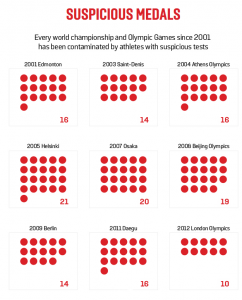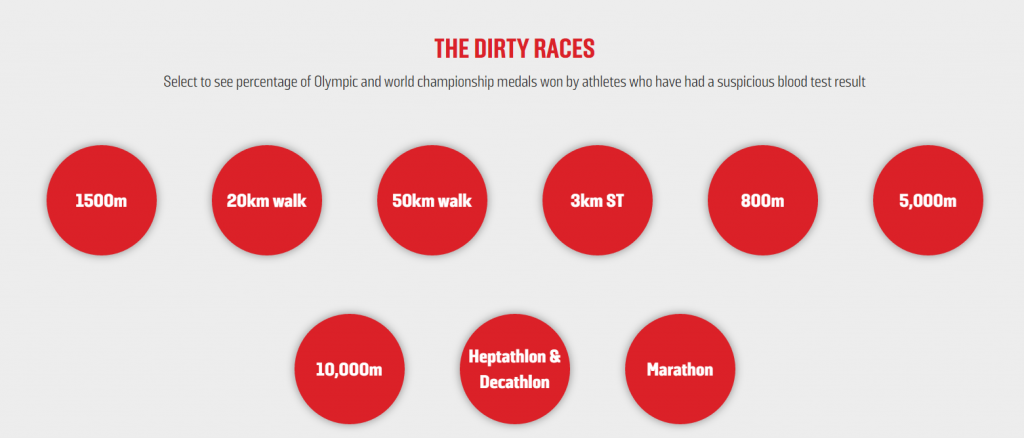The Good, The Bad, and The Interesting From the Sunday Times Doping in Athletics Data
by: LetsRun.com
August 17, 2015
Editor’s note: Some of these stats are in a separate article that has our main thoughts about the Sunday Times doping series, but we decided to put them all here in case you did not read the series and wanted to just see numbers.
The last three Sundays, the Sunday Times has had a series of articles that have garnered a ton of attention about the doping problem in Athletics. The genesis of the articles was a leaked IAAF blood database from 2001-2012 that has the results of all the blood tests conducted by the IAAF during that time period.
We think some of the conclusions reached by the general press on the series have been a bit sensationalist and discuss the Sunday Times articles in more depth in a separate article here. Also because of the articles we have Three Things That Need to be Done To Immediately Improve the Anti-Doping Fight.
But if you don’t want to read boring prose, we’ve got some interesting stats from the Sunday Times leaked data below. We also highly recommend you check out Sunday Times interactive doping data here.
We decided to present it as The Good, The Bad, and The Interesting.
Overall, the Sunday Times said one-third of medallists from 2001-2012 had at least one suspicious blood test result.
The Good:
The Drug Testers Are Doing a Better Job of Catching Blatant Dopers
Blatant Doping Is Just 2/3rds of What It Used To Be
The Times said only 1 distance gold medal (5.9%) from the 2012 Olympics was from an athlete that had a suspicious blood value. That is an extremely positive development and to us means the system is catching the most blatant cheats. Now the weird thing is two distance gold medallists from London 2012 (Aslı Çakır Alptekin and Yuliya Zaripova) are already being sanctioned using the biological passport. Is there the possibility the IAAF caught more people with the biological passport from London than the Sunday Times experts? or did the Sunday Times remove Aptekin and Zaripova from their results? We are not sure because there was not a ton of transparency in what was released by the Sunday Times. London also had the lowest number (10 = 20%) of medallists with suspect blood values. Apart from London, from 2001-2012, 38.2% of golds were suspicious and 33.6% of medals, so London was a big step in the right direction. If one looks at the last 3 Worlds/Olympics from 2009 to 2012 to and compares it to the previous 3 from 2005 to 2008, the number of suspect medallists is down by a 1/3rd. It went down from an average of 20 suspect medals to 13.33. That is a step in the right direction.
Kenyan Medallists are WAY LESS Likely To Dope Than Other Distance Medallists
Non-Russian Medallists are 58% More Likely to Have Suspect Blood Values Than Kenyan Medallists
This one gets its own bullet point, because we’re sickof getting emails from visitors along the lines of “See, all the Kenyans are dirty.” Kenya has been singled out in media discussion along with Russia. Some of that is because of the ARD documentary which had some very troubling footage of athletes shooting up with EPO in Kenya, but let us not let sensationalism get in the way of facts. Rather than single out Kenya for doping, the data easily could have been used to say the Kenyan medallists are way LESS likely to have suspicious blood values than other medallists. The Times wrote, “Kenya, renowned for producing great distance-runners, is also a doping hotbed, with questions over 18 of the country’s medals.” (What the Sunday Times did not mention was Kenyan won an amazing 92 medals in this time period). What did the IAAF blood passport data show? That the Kenyans had suspicious values at a much lower rate than the medallists overall, even after your removed the Russians. We took the Sunday Times data and extrapolated that 19.6% of Kenyan medals came from someone who had at least one suspect blood value. The Sunday Times said 80% of Russian medals came from suspect athletes. Once we removed the Russians and Kenyans from the data, we found 31.1% of the remaining medals (80/257) were from suspect athletes. So a Kenyan distance medal is way less likely (19.6%) to be suspect than a medallist from someone from another country (31.6%). Some might say we shouldn’t be celebrating that 19.6% of Kenyan medals may be suspects, but we just want to provide some context. So we’ll now turned to the bad:
The Bad:
Double Gold Medal Winners Are More Likely to Have Suspicious Blood Values
This isn’t that surprising, but the Sunday Times found the better you are,the more likely you may be up to something not on the up and up. Overall 32% of medals were won by athletes who had a suspicious value, yet the Sunday Times said “athletes who had won at least two gold medals at the world championships had recorded likely doping or suspicious blood-test results.” (However as we noted in our companion article calling for more transparency, the Sunday Times did not define this “suspicious blood-test” standard or how many athletes were in each category.
Over 50% of Medals in the 1500 Are from Athletes With Suspicious Values
We discuss this more at the bottom (with a chart by event of suspicious values), but any time half the medals are suspicious is not good and the Sunday Times showed 54% of the medals at 1500 were by suspicious athletes (although with the Russians and known cheats Ramzi having won medals in this event and the medals still being on the books this may skew the numbers, as they eventually were caught – just not banned retroactively)
Microdose Away
Using steroids? The blood passport data the Sunday Times looked at isn’t going to catch you. Microdosing properly? Not likely to get caught. There will always be cheats in sport, but the good news now, is the most blatant EPO cheats are getting caught. The bad news is even if the Sunday Times data had said no one had suspicious blood values, there still would be people cheating.
The Interesting:
Blatant Blood Cheats are Less Likely The Longer Distance
One would think, blood boosting would help more the longer the distance, but that does not appear to be the case if suspicious blood values are correlated with how many athletes were cheating. Here is the breakdown by event of the medallists from 2001-2012 with a suspicious value at some time in their life:
| Event | % of suspicious medals |
| 800m | 30% |
| 1500m | 54% |
| 5k | 28% |
| 10k | 28% |
| steeple | 33% |
| Marathon | 11% |
| 20km walk | 52% |
| 50k walk | 48% |
| Decathlon/Heptathlon | 17% |
The most “dirty” event is the men’s 1500 in terms of suspicious blood profiles. The least “dirty” distance running event in terms of suspicious blood values was the marathon. That may surprise some as many people falsely assume that EPO helps long distance runners more than 1500 runners. That stat isn’t a shock to some smart LetsRun posters who have been saying for a while now that EPO helps the 1500 more than the marathon
See this: “This is why 1500 is probably the MOST DOPEABLE event.” post which first brought it to our attention and this whole thread on the idea.
- 41% of the top 10 fastest times run by men in each endurance event were by athletes who had a suspicious blood test
- 30% of the top 10 fastest times run by women in each endurance event were by athletes who had a suspicious blood test
- New Zealand Almost Clean as Snow
Here’s the Sunday Times breakdown on suspicious tests (above the 1/100 standard) by country.
| Russia | 30% |
| Ukraine | 28% |
| Turkey | 27% |
| Greece | 26% |
| Morocco | 24% |
| Bulgaria | 20% |
| Bahrain | 20% |
| Belarus | 19% |
| Slovenia | 16% |
| Romania | 13% |
| Brazil | 12% |
| Kenya | 11% |
| Holland | 11% |
| Spain | 11% |
| Colombia | 11% |
| Jamaica | 9% |
| Slovakia | 8% |
| Qatar | 8% |
| Ethiopia | 8% |
| Cuba | 8% |
| Portugal | 8% |
| Czech Republic | 7% |
| Eritrea | 7% |
| Bahamas | 7% |
| South Korea | 7% |
| Sweden | 7% |
| Latvia | 6% |
| Germany | 6% |
| Belgium | 6% |
| Italy | 6% |
| Mexico | 6% |
| China | 5% |
| Norway | 5% |
| France | 5% |
| Poland | 5% |
| Japan | 5% |
| Algeria | 5% |
| India | 5% |
| USA | 5% |
| Lithuania | 4% |
| Estonia | 4% |
| Switzerland | 4% |
| Austria | 4% |
| Finland | 4% |
| Great Britain | 4% |
| South Africa | 4% |
| Australia | 3% |
| Kazakhstan | 3% |
| Trinidad and Tobago | 3% |
| Ireland | 3% |
| Canada | 3% |
| Serbia | 3% |
| New Zealand | 2% |
More: LetsRun.com’s Thoughts on the Sunday Times Doping Investigation
*Three Things That Need to be Done To Immediately Improve the Anti-Doping Fight


